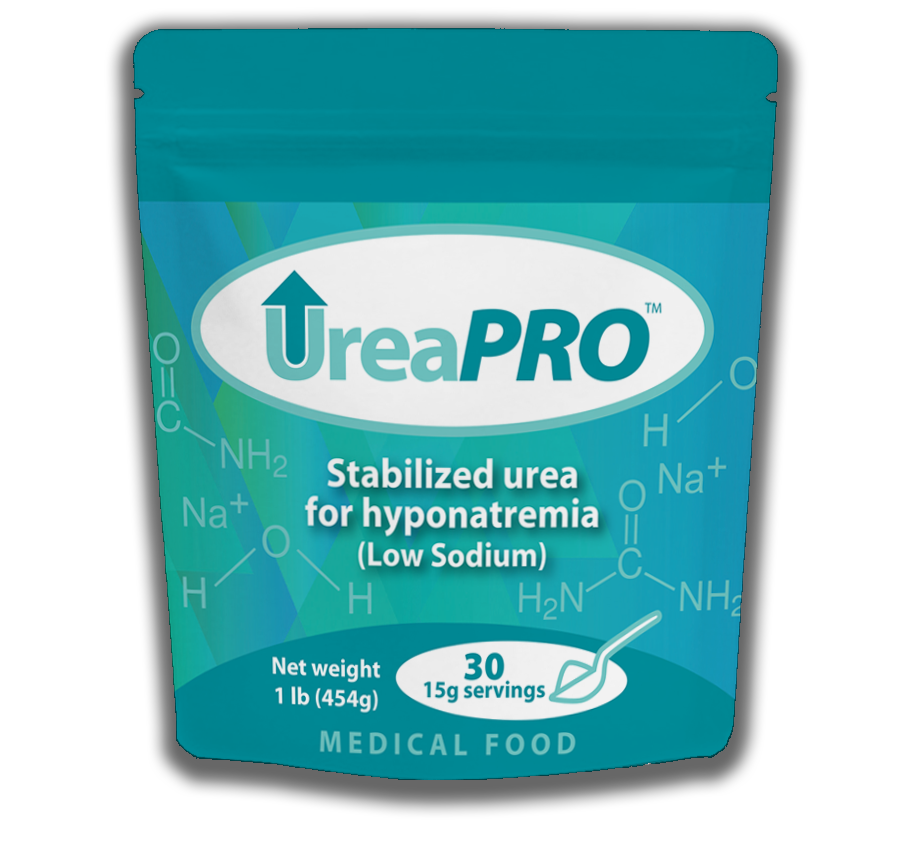
UreaPRO Information For Pharmacists
UreaPro has the same safety and efficacy of ure-Na which used in America's hospitals, but with added affordability.
UreaPRO wholesale availability:
UreaPROs is available from Cencora, Cardinal and McKesson
Cencora item #: 10275148
McKesson item #: 2937431
Cardinal Item #: 5968318



UreaPRO NDC # 62530-0000-17
UreaPRO UPC #: 862530000178
Mechanism of Action of urea for the treatment of hyponatremia
Urea normalizes serum sodium by inducing osmotic excretion of free water without associated electrolyte depletion. Urea also ameliorates hyponatremia in SIADH by a more specific effect, diminishing the natriuresis in association with increased medullary urea content.
European renal best practice guidelines for the treatment of SIADH
7.4.3. Patients with SAIDH
| 7.4.3.1 | In moderate or profound hyponatremia, we suggest restricting fluid intake as a first-line-treatment (2D). |
| 7.4.3.2 | In moderate or profound hyponatremia, we suggest the following can be considered equal second-line treatments: a) Increasing solute intake with 0.25–0.50g/kg per day if urea or a combination of low dose loop diuretics and oral sodium chloride (2D). |
| 7.4.3.3 | In moderate or profound hyponatremia, we recommend against lithium or demeclocycline (1D). |
| 7.4.3.4 | In moderate hyponatremia, we do not recommend vasopressin receptor antagonists (1C). |
| 7.4.3.5 | In profound hyponatremia, we recommend against vasopressin receptor antagonists (1C). |
Inpatient use
For inpatient use, ure-Na is available from Pharmaceutical wholesalers and via inpatient serving pharmacies. Click on the ure-Na logo for more information.
UreaPro dosing chart based off of the European Guidelines.
mOsm comparison of urea vs. NaCl
1 - 15 gram scoop of UreaPro equals 250 mOsm, equal to 14.7 500mg NaCl tablets or 7.35 1g NaCl tablets.
2 - 15 gram scoops of UreaPro contains 30g of urea and equals 500 mOsm, equal to 29.4 500mg NaCl tablets or 14.7 1g NaCl tablets.
Patients not appropriate for UreaPro
- Patients with hypovolemic hyponatremia
- Patients with hyponatremia associated with adrenal insufficiency
- Patients with hyperammonemia
Click below to view a presentation on the clinical data for the use of urea for the outpatient management of hyponatremia.
November 2018 CJASN published clinical study on the use of ure-Na to treat hyponatremia in the inpatient setting.
ASN Kidney News editorial featuring our sister product ure-Na
UreaPro and BUN
Urea is produced normally in the body by the liver. As such, it is considered safe (GRAS designation by the FDA), and does not carry nephrotoxic or hepatotoxic potential. Since the blood test for BUN measures Blood Urea Nitrogen levels, it is expected that when UreaPro is administered, an increase in BUN levels may be seen. However, this isolated increase in not indicative of kidney function, and is similar to what may be seen when individuals consume a high protein diet with production of additional amounts of urea by the liver.
UreaPro should be used under medical supervision with close monitoring of laboratory studies.
UreaPro Ingredients
Ingredients in descending order:
- Synthetically derived urea powder
- Silica
- Calcium Silicate

UreaPro with 30 doses containing 15g urea per dose.







